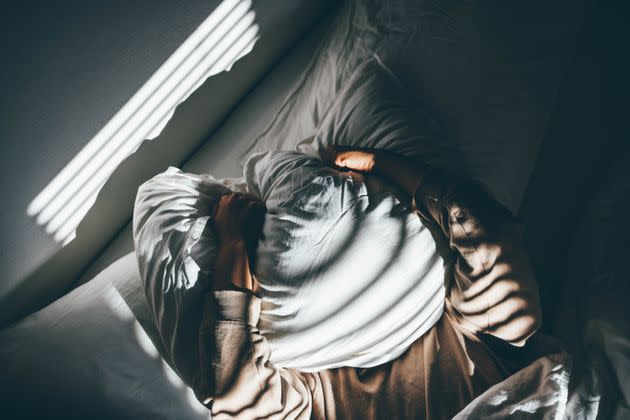How To Sleep Longer During Shorter Nights

Woman suffering from depression. Woman covering her face with pillow. (Photo: Maria Korneeva via Getty Images)
Summer is here in full force and there’s nothing like waking up to the sun beaming into your bedroom. Even though it’s refreshing to wake up to blue skies, it can be difficult falling asleep at night when it stays lighter for longer.
If you’re like me, you’ll also wake up at 5:00am every morning at the crack of dawn. Equally, getting a good night’s rest can be more difficult due to things like hay fever and high temperatures. So, what to do?
Alison Jones, a sleep expert at mattress brand Sealy, shares her top tips on how to improve your sleep quality during those shorter and warmer nights.
Keep the light out
If your body naturally wakes you up early like mine, you might need to invest in some blackout blinds. “Our circadian rhythm, otherwise known as our internal body clocks, determines why we feel alert during the day and then sleepy at night,” Jones says.
“This means longer days wreak havoc on our sleep quality as light pours into our bedrooms, making it difficult for our bodies to determine when it is time for bed. As it darkens outside, our bodies produce the hormone melatonin which helps ease us into sleepiness. ”
Get the right room temperature
Having the right temperature in your bedroom can help you achieve the perfect night’s sleep. Research suggests 18.3ºC is the best bedroom temperature for fuss-free nights.
Our bodies are programmed to drop in core temperature at night. So opening the window to make the room cool may help with temperature regulation and signal your body that it’s time for bed.
Exercise at the right time
When the weather is warm it’s best to avoid exercising during the daytime when the temperatures will be at their highest. “Instead, try an evening jog or walk when the temperature has cooled down as not only is this the optimal time to get your workout in, it will also tire your muscles out before bed,” Jones says.
“When exercising during the summer, consider opting for a lighter form of activity such as walking, yoga or simply stretching. This is because intense workouts before bed can increase your body temperature too much and make it harder to drift off.”
If you still want a high intensity workout, consider moving it to early morning, before it gets too hot.
Stretching before bed
If you struggle to nod off, stretching may be able to give you a blissful sleep. It can help you improve blood flow and relieve muscle tension – which both help muscle recovery and sleep quality. Getting your body to relax before you sleep will help make your sleep more effective.
“Stretching can also be a great alternative night time activity to scrolling through social media on your phone or tablet, which could be keeping you up at night,” Jones adds.
“Stretching encourages mindfulness as it helps to focus your attention on your breath and body, as opposed to the stresses of the day. It also offers physical benefits, helping to relieve muscle tension and prevent sleep-disrupting cramps.”
Warm showers
Taking a warm shower before bed can help improve the quality of your sleep. A study found that taking a bath bath between about 104.5 and 106 degrees Fahrenheit lowered blood pressure before and during sleep, especially if you take the bath an hour before you sleep.
“A slightly warmer or lukewarm shower an hour before bed can help you lose heat more efficiently,” Jones says.
This article originally appeared on HuffPost UK and has been updated.

 Yahoo Movies
Yahoo Movies 
